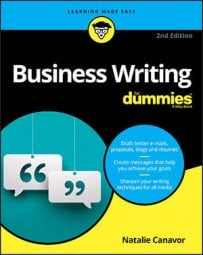Keep in mind that people born into another culture may speak English very well, but their writing and reading skills in the language typically lag behind. It's especially hard to write an adopted language. Fortunately, the principles of good business writing come to your aid to help you bridge differences in culture, language, and educational level.
Here are some of the guidelines that especially apply. Take them into account on an everyday level, too, if your workplace (like most today) is multicultural, or you want to reach prospective clients whose English language skills are limited.
- Use short, simple, basic sentences. Avoid multi-clause structures with more than one comma.
- Keep paragraphs short so there is plenty of breathing space between them. Dense pages are intimidating.
- Resist contractions. For example, write do not rather than don't.
- Use short basic words, but bear in mind that many short words in English have multiple meanings and may be used as nouns as well as verbs. Run, for example, can be either. Look has a number of meanings.
- Omit idioms, slang, and colloquialisms that overseas readers are unlikely to understand. These words and phrases are rampant in written and spoken English, so develop an awareness of those you tend to use and find substitute wording
- Avoid most metaphors, especially those based on sports that other countries don't understand and don't find interesting — for example, American baseball, English cricket.
- Avoid passive tense and indirect phrasing as much as possible. "Our legal office prepared the contract" is better than "The contract has been prepared by our legal office."
- Minimize "stately" abstract words such as those that end in "ion" and "ment," which produce awkward wordy constructions. For example, "The accomplishment of the building's construction is planned for June" is better said as, "We plan to finish the building in June."
- Don't abbreviate words, including abbreviations borrowed from texting. Readers may not understand or like them.
- Eliminate buzzwords and intracompany or industry-insider acronyms and language.
In addition to writing style, consider cultural preferences when you communicate across borders. American business English style is seen as too casual for people in many other parts of the world, though this is changing as younger generations predominate. Meanwhile it is smart to observe more formal conventions—such as using people's titles and last names rather than first names when you write--if you want to elicit good responses. And be scrupulously courteous. This is never taken amiss.
When it's important to successfully engage businesspeople or potential customers in another country, take the trouble to know what the specific culture expects. Writing to someone in France or Japan or Russia suggests quite different protocols. Ideally, find someone from the specific culture conversant with its business customs and language to advise you.

